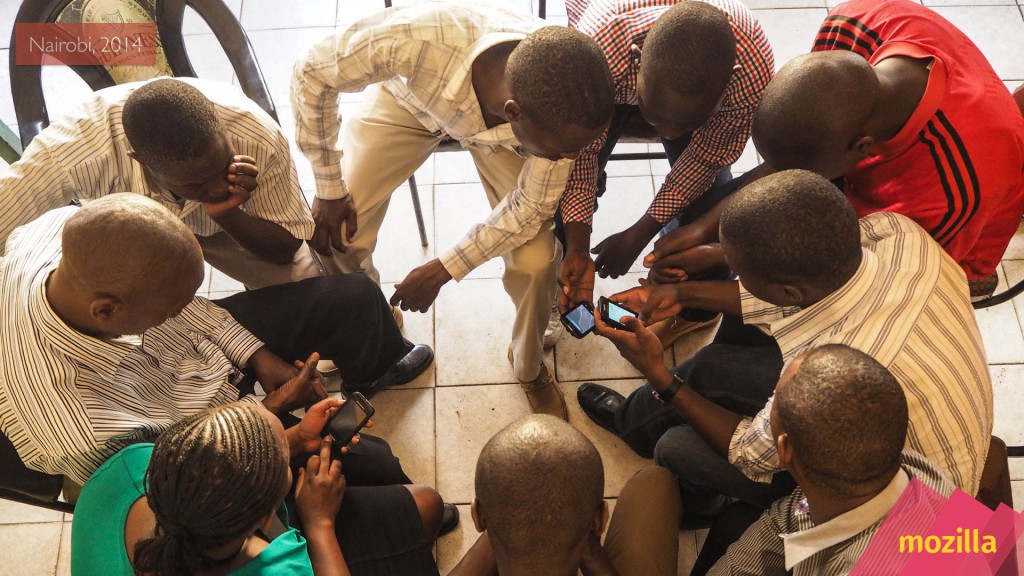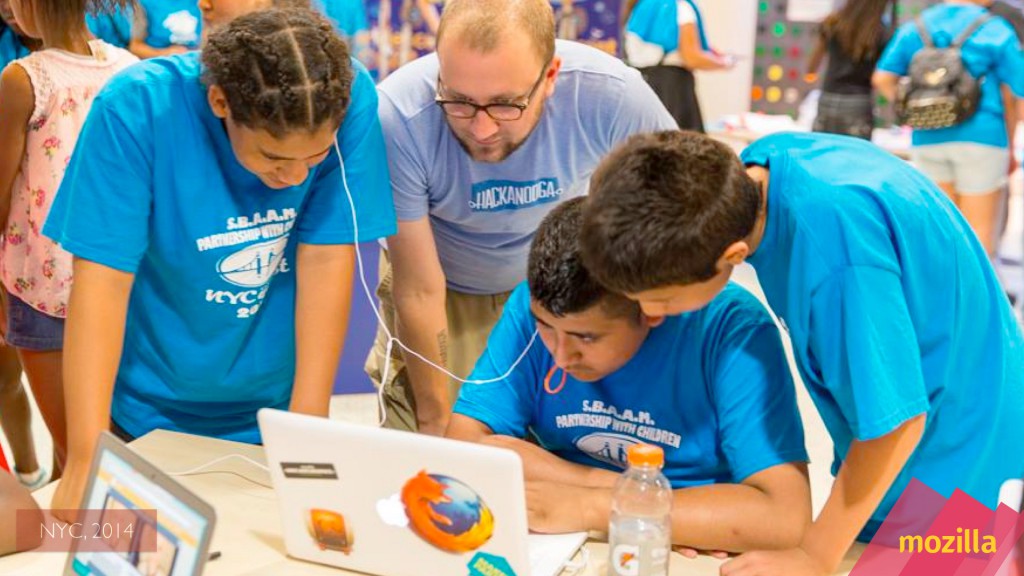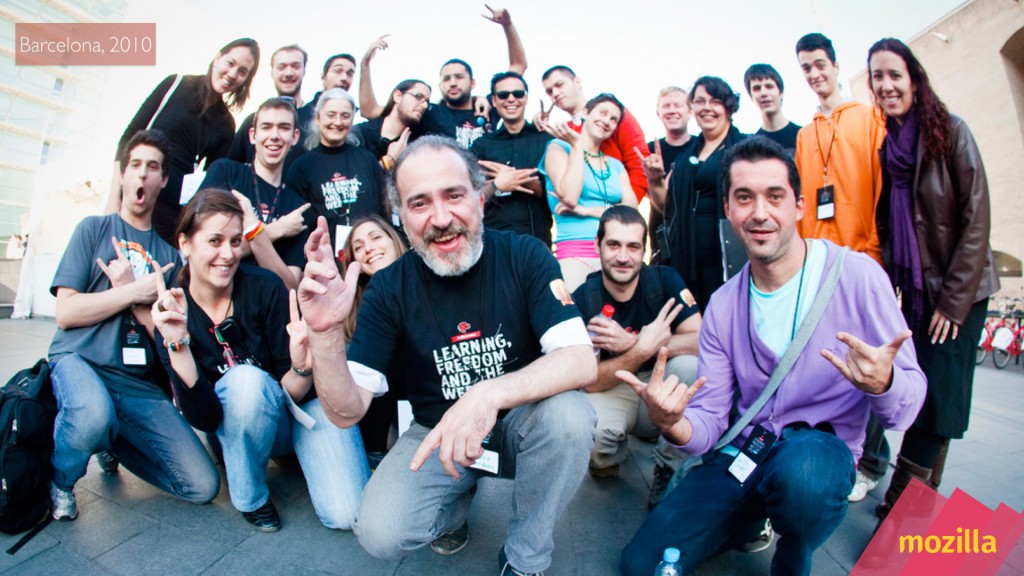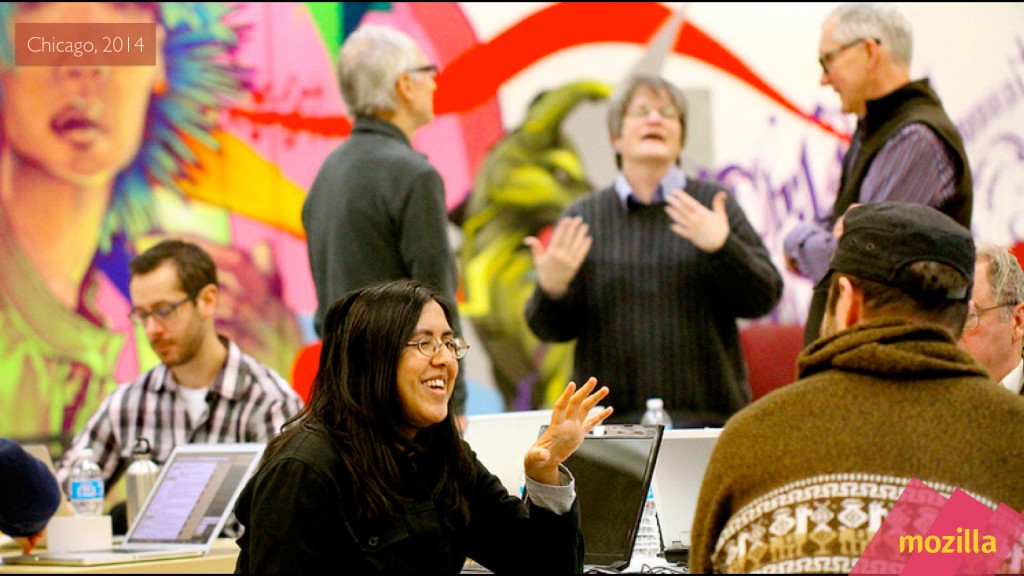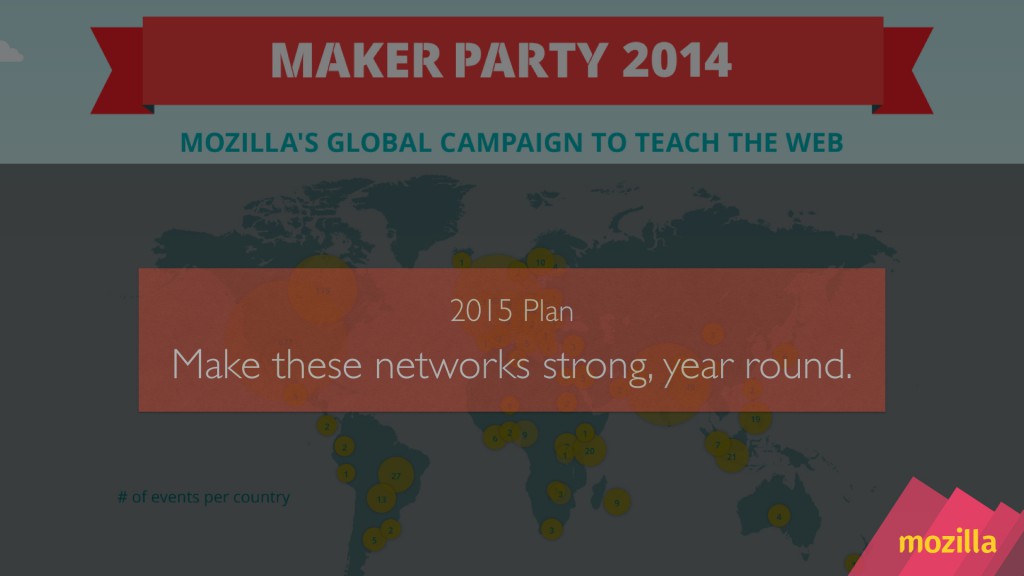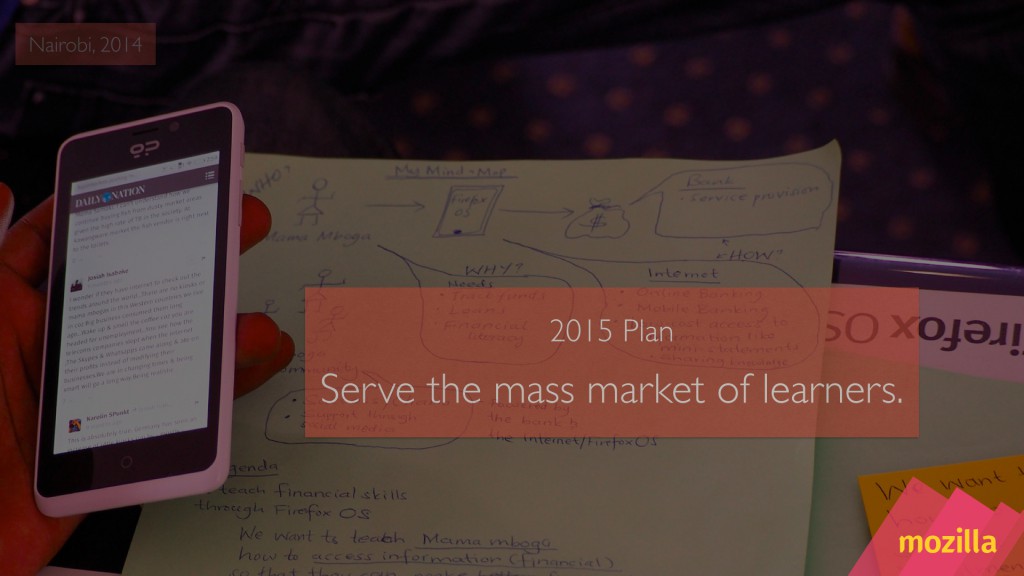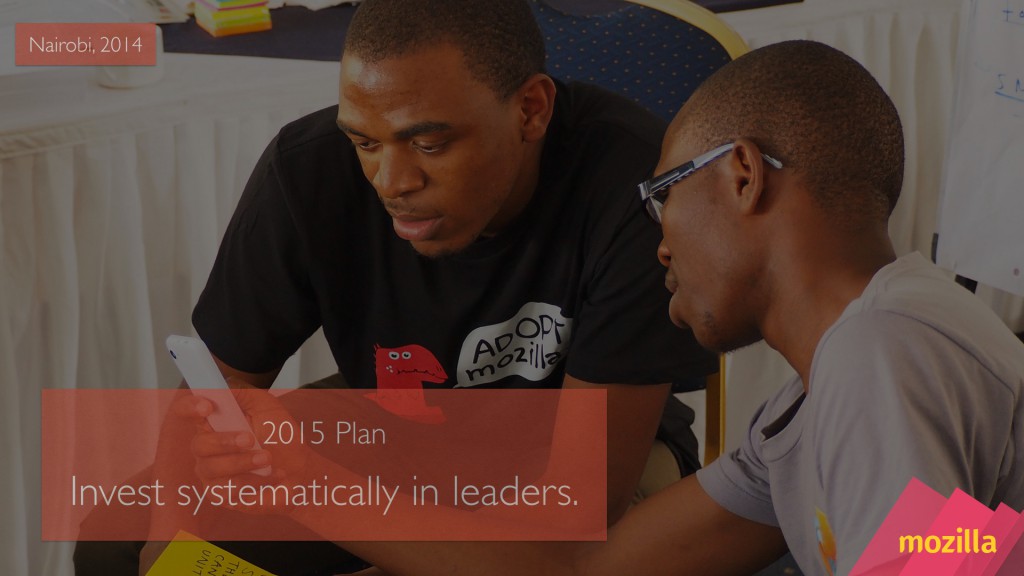Within ten years, there will be five billion citizens of the web.
Mozilla wants all of these people to know what the web can do. What’s possible. We want them to have the agency, skills and know-how they need to unlock the full power of the web. We want them to use the web to make their lives better. We want them to know they are citizens of the web.
Mozilla Learning is a portfolio of products and programs that helps people learn how to read, write and participate in the digital world.
Building on Webmaker, Hive and our fellowship programs, Mozilla Learning is a portfolio of products and programs that help these citizens of the web learn the most important skills of our age: the ability to read, write and participate in the digital world. These programs also help people become mentors and leaders: people committed to teaching others and to shaping the future of the web.
Mark Surman presents the Mozilla Learning vision and plan in Portland, Dec 2015
Three-year vision
By 2017, Mozilla will have established itself as the best place to learn the skills and know-how people need to use the web in their lives, careers and organizations. We will have:
- Educated and empowered users by creating tools and curriculum for learning how to read, write and participate on the web. Gone mainstream.
- Built leaders, everywhere by growing a global cadre of educators, researchers, coders, etc. who do this work with us. We’ve helped them lead and innovate.
- Established the community as the classroom by improving and explaining our experiential learning model: learn by doing and innovating with Mozilla.
At the end of these three years, we may have established something like a “Mozilla University” — a learning side of Mozilla that can sustain us for many decades. Or, we may simply have a number of successful learning programs. Either way, we’ll be having impact.
We may establish something like a “Mozilla University” — a learning side of Mozilla that can sustain us for many decades.
2015 Focus
1) Learning Networks
2) Learning Products
3) Leadership Development
Our focus in 2015 will be to consolidate, improve and focus what we’ve been building for the last few years. In particular we will:
- Improve and grow our local Learning Networks (Hive, Maker Party, etc).
- Build up an engaged user base for our Webmaker Learning Products on mobile and desktop.
- Prototype a Leadership Development program, and test it with fellows and ReMo.
The short term goal is to make each of our products and programs succeed in their own right in 2015. However, we also plan to craft a bigger Mozilla Learning vision that these products and programs can feed into over time.
A note on brand
Mozilla Learning is notional at this point. It’s a stake in the ground that says:
Mozilla is in the learning and empowerment business for the long haul.
In the short term, the plan is to use “Mozilla Learning” as an umbrella term for our community-driven learning and leadership development initiatives — especially those run by the Mozilla Foundation, like Webmaker and Hive. It may also grow over time to encompass other initiatives, like the Mozilla Developer Network and leadership development programs within the Mozilla Reps program.
In the long term: we may want to a) build out a lasting Mozilla learning brand (“Mozilla University?”), or b) build making and learning into the Firefox brand (e.g., “Firefox for Making”). Developing a long-term Mozilla Learning plan is an explicit goal for 2015.

What we’re building
Practically, the first iteration of Mozilla Learning will be a portfolio of products and programs we’ve been working on for a number of years: Webmaker, Hive, Maker Party, Fellowship programs, community labs. Pulled together, these things make up a three-layered strategy we can build more learning offerings around over time.
- The Learning Networks layer is the most developed piece of this picture, with Hives and Maker Party hosts already in 100s of cities around the world.
- The Learning Products layer involves many elements of the Webmaker.org work, but will be relaunched in 2015 to focus on a mass audience.
- The Leadership Development piece has strong foundations, but a formal training element still needs to be developed.
Scope and scale
One of our goals with Mozilla Learning is to grow the scope and scale of Mozilla’s education and empowerment efforts. The working theory is that we will create an interconnected set of offerings that range from basic learning for large numbers of people, to deep learning for key leaders who will help shape the future of the web (and the future of Mozilla).

We want to increasing the scope and diversity of how people learn with Mozilla.
We’ll do that by building opportunities for people to get together to learn, hack and invent in cities on every corner of the planet. And also: creating communities that help people working in fields like science, news and government figure out how to tap into the technology and culture of the web in their own lives, organizations and careers.
The plan is to elaborate and test out this theory in 2015 as a part of the Mozilla Learning strategy process. (Additional context on this here: http://mzl.la/depth_and_scale.)
Contributing to Mozilla’s overall 2015 KPIs
How will we contribute to Mozilla’s top-line goals? In 2015, We will measure success through these two key performance indicators: relationships and reach.
- Relationships: 250K active Webmaker users
- Reach: 500 cities with ongoing Learning Network activity
Learning Networks
In 2015, we will continue to grow and improve the impact of our local Learning Networks.
- Build on the successful ground game we’ve established with teachers and mentors under the Webmaker, Hive and Maker Party banners.
- Evolve Maker Party into year-round activity through Webmaker Clubs.
- Establish deeper presence in new regions, including South Asia and East Africa.
- Improve the websites we use to support teachers, partners, clubs and networks.
- Sharpen and consolidate teaching tools and curriculum built in 2014. Package them on their own site, “teach.webmaker.org.”
- Roll out largescale, extensible community-building software to run Webmaker clubs.
- Empower more people to start Hive Learning Networks by improving documentation and support.
- Expand scale, rigour and usability of curriculum and materials to help people better mentor and teach.
- Expand and improve trainings online and in-person for mentors.
- Recruit more partners to increase reach and scope of networks.
Learning Products
Grow a base of engaged desktop and mobile users for Webmaker.
- Expand our platform to reach a broad market of learners directly.
- Mobile & Desktop: Evolve current tools into a unified Webmaker making and learning platform for desktop, Firefox OS and Android.
- Tablet: Build on our existing web property to address tablet browser users and ensure viability in classrooms.
- Firefox: Experiment with ways to integrate Webmaker directly into Firefox.
- Prioritize mobile. Few competitors here, and the key to emerging markets growth.
- Lower the bar. Build user on-boarding that gets people making / learning quickly.
- Engagement. Create sticky engagement. Build mentorship, online mentoring and social into the product.
Leadership Development
Develop a leadership development program, building off our existing Fellows programs.
- Develop a strategy and plan. Document the opportunity, strategy and scope. Figure out how this leadership development layer could fit into a larger Mozilla Learning / Mozilla University vision.
- Build a shared definition of what it means to be a ‘fellow’ at Mozilla. Empowering emerging leaders to use Mozilla values and methods in their own work.
- Figure out the “community as labs” piece. How we innovate and create open tech along the way.
- Hire leadership. Create an executive-level role to lead the strategy process and build out the program.
- Test pilot programs. Develop a handbook / short course for new fellows.
- Test with fellows and ReMo. Consider expanding fellows programs for science, web literacy and computer science research.
Get involved
- Learn more. There’s much more detail on the Learning Networks, Learning Products and Leadership Development pieces — plus other key initiatives — in our complete Mozilla Learning plan.
- Get involved. There’s plenty of easy ways to get involved now with Webmaker and our local Learning Networks today.
- Get more hands-on. Want to go deeper? Get hands-on with code, curriculum, planning and more through build.webmaker.org
